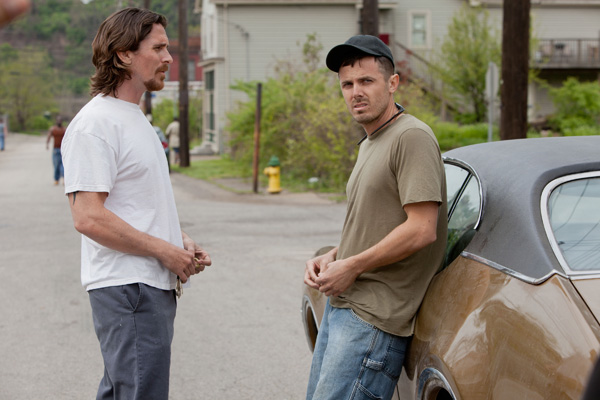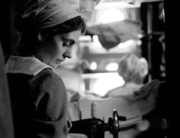The opening scene of Out of the Furnace is one of the best pre-credit stretches in recent memory. It definitively and effortlessly establishes mood, setting, character, and tone in a matter of moments, all of which are unsettling and grimy. The scene unfurls in a seedy drive-in theater, where Woody Harrelson’s Harlan DeGroat is stewing hatefully next to his meth enthusiast date.
DeGroat wears several enormous, trashy rings on each hand, an oversized earring, and necklace to match with a sleeveless military-style shirt. He goes out of his way to find reasons to degrade and bully his date, eventually culminating in an act of violence with no precedent outside of Heath Ledger’s Joker’s famous disappearing pencil “magic trick” from 2008’s The Dark Knight—but in a more intimate and unnerving way. The scene escalates from there, and we are left with an indelible impression of an evil that creeps undeterred through the backwoods of the Northeast. The scene plays out around a neat, unobtrusive conceit that grounds the film’s ambition, as the drive-in movie plays out in the background of the disquietingly realistic violence wrought by DeGroat. The message is clear: Out of the Furnace intends to be a realistic look at the economic and moral rot of early 21st century America, not a piece of escapist entertainment.
Out of the Furnace focuses on brothers Russell and Rodney Baze in rundown Braddock, PA. Set in 2008, jobs are in short supply, and the local steel mill, where Russell (Christian Bale) and their dying father worked, has no appeal to Rodney, who prefers to make money in bare-knuckle fighting rings. Rodney (Casey Affleck), a veteran of multiple Iraq War tours, feels that as an American hero he deserves more than his family’s dead end mill life. Russell, the older brother, is as good of a man as DeGroat is bad, and does his best to guide Rodney away from his self-destructive path, working double shifts to bail Rodney out of debts to local bookie John Petty (Willem Dafoe). He also spends as much time as possible with his dying father, and has a loving, healthy relationship with his beautiful schoolteacher girlfriend, Lena (Zoë Saldana).
After a meeting with Petty where he bails Rodney out, Russell is encouraged to have a drink by the friendly bookkeeper, and on his way home is involved in a breathlessly tense and excruciating car crash that does not seem like his fault. Yet, there is a dead child in the other car and Russell had been drinking—he goes to prison for several years, all because he went too far out of his way to help his lost little brother.
While imprisoned, Russell’s father dies and Lena moves on to a relationship with Braddock’s police chief (Forest Whitaker). All Russell has left is his mill job and Rodney, who shows no signs of getting past his posttraumatic stress. Affleck, with his high-pitched, whiney voice and perpetually boyish looks, is perfectly cast as the frustrated little brother, and he shines when he allows his repressed rage to come roaring out. His undercurrent of anger is his greatest asset as a brawler, enabling him to hurt opponents much larger than himself, but it also clouds his ability to follow the instructions to throw a fight at certain times.
He claims that he gets Iraq flashbacks and everything goes blurry, and all he can do in the moment is lash out. This blurriness leads to a clash with DeGroat’s fighting ring in rural New Jersey. The violent clash between Rodney and DeGroat catalyzes the main events of the plot, and Russell has to grapple with having lost his father, his lover, and maybe his brother, on top of the years he lost in a cell. The film excels at depicting how far one decent man can be pushed by life, while the malicious, contemptible DeGroat gets everything he wants.
Russell’s role as the solid moral pillar at the center of the chaos is put to extreme tests, and the drama at the back end of the film is whether Russell will finally break under the pressure. As much as Out of the Furnace wants to be a character-driven look at socioeconomic hardships, it is probably most notable for its several top-notch scenes of escalating suspense, the opening drive-in scene being just one of many. Bale is masterful at playing a decent man caught in the most grisly circumstances, and he brings the audience into those experiences in a memorable way.
Out of the Furnace shares a gritty, naturalistic aesthetic with last year’s Killing Them Softly and this year’s The Place Beyond the Pines. All three focus on derelict Northeastern suburban communities hit hard by economic downturn and on the danger of resorting to crime to provide for family. But while Killing Them Softly was overly focused on telling a tight story, to the exclusion of establishing a world or point of view, and The Place Beyond the Pines tried to cram too many disparate plot threads into one film, Out of the Furnace strikes the right balance of story and worldview.







Leave A Comment